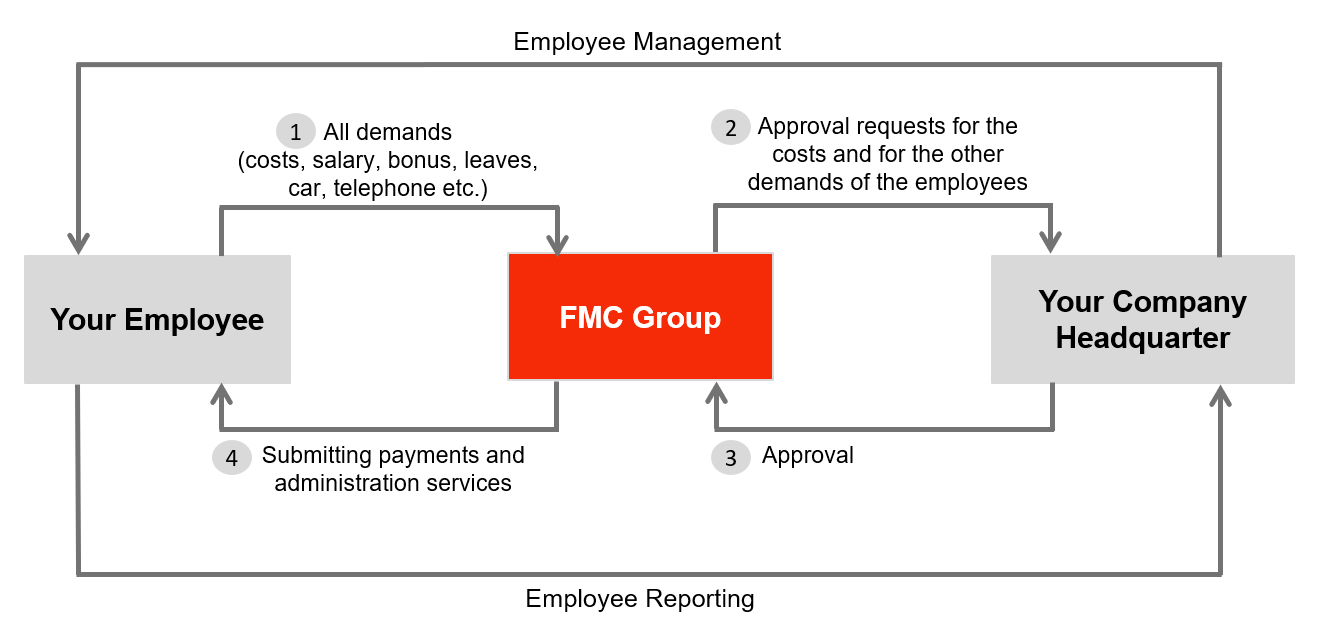
Employer of Record Italy
Our Employer of Record in Italy service enables clients to hire employees without the need to operate a local legal entity there.
It makes a big difference to develop a new market with your own personnel on the ground. Particularly for functions related to sales & marketing, business development, distributor management, and service & maintenance, our customers are very satisfied using our Italy Employer of Record Service.
Our customers and their local teams can be free of the distractions of administrative tasks and complex local requirements. So you can fully focus on the development of your core business.
If your local business grows large enough, you can easily transfer the employees to your own subsidiary. It also provides a quick exit strategy if necessary. In addition to Italy, we offer Employer of Record services in several other countries.
Content:
- Employer of Record Italy – FMC Group’s Approach
- Hiring an Employee
- Income Tax
- Typical Benefits
- Visa for the Employees
- Time off Policies
- Terminating an Employee

Get in touch with us

Employer of Record Italy - FMC Group's Approach
- Quick, flexible, and easy entry into Italy in compliance with local employment laws
- Complete control over business development with your own team
- Good option for building up, managing, and supporting your distributors and key accounts by directly observing local developments and adjusting the strategy whenever necessary
- Using our comprehensive recruitment experience for international clients, we can form a local team that fits your corporate culture.
- Focusing on your core business instead of dealing with the time-consuming and complex local administrative tasks
- Allowing for easy market exit if necessary
- Integrating your employees into our team through motivational events and special meetings
EOR Italy Management & Reporting Flow

Hiring an Employee
Employment Contract – indefinite vs. fixed term
In Italy, it is mandatory for employers to provide official employment agreements to every employee. These agreements must encompass essential job specifics like compensation, working hours, perks, and entitlements. Additionally, they must be documented in Italian and utilize the Euro currency.
Probation Period
Probation periods range from three to six months for permanent contracts. During this time, both the employer and the employee have the opportunity to assess whether the job is a good fit.
For temporary contracts, such as fixed-term contracts or project-based employment, the probationary period may be shorter or nonexistent, depending on the terms of the contract and labor laws.
Work Week, Overtime & Maximum Working Hours
Income Tax
Typical Benefits
- Paid Time Off : Italian law mandates a minimum of 20 days of paid leave per year. This includes both vacation days and national holidays. Some companies may offer additional days off or longer vacation periods.
- Health Insurance: The Italian National Health Service (SSN) provides universal coverage for basic healthcare needs. However, many employers offer supplementary private health insurance plans to their employees, which can cover additional medical services and treatments.
- Pension Plans: Employers typically contribute to the Italian state pension system on behalf of their employees. Additionally, some companies offer supplementary pension plans or retirement savings schemes to help employees save for retirement.
- 13th month Salary: In Italy, it’s customary for employees to receive an annual bonus known as the ’13th-month’ salary. Although not mandated by law, this extra payment is typically given out around Christmastime.
Visa for the Employees
- European Union (EU) Citizens: Citizens of EU member states, as well as citizens of Norway, Iceland, Liechtenstein, and Switzerland, have the right to work in Italy without needing a visa or work permit.
- Non-EU Citizens: Non-EU citizens typically need a work visa and permit to work legally in Italy. The type of visa required depends on the nature of the employment:
- Highly Skilled Workers: Italy has specific visa categories for highly skilled workers, such as the “EU Blue Card” for those with certain qualifications and job offers, or the “Intra-Corporate Transfer (ICT)” visa for employees transferred within a company.
- Seasonal Workers: There are seasonal work visas available for certain industries, such as agriculture and tourism.
- Self-Employment: Non-EU citizens intending to establish their own business or work as freelancers in Italy may need to apply for a visa specifically for self-employment.
- Sponsored Employment: For most other types of employment, the prospective employer in Italy typically needs to sponsor the visa application. This involves obtaining a work contract and sometimes demonstrating that no qualified EU candidates are available for the position.
Time off Policies
Public Holidays
- New Year’s Day
- Epiphany
- Easter Sunday
- Easter Monday
- Liberation Day
- Labor Day / May Day
- Republic Day
- Assumption of Mary
- All Saints’ Day
- Feast of the Immaculate Conception
- Christmas Day
- St. Stephen’s Day
Annual Leave
In Italy, employees have the right to a minimum of 20 days of paid vacation leave, calculated on the basis of a five-day working week.
Sick Leave
In Italy, the statutory minimum sick leave is 3 days, and the maximum is 6 months. During the initial 3 days, the employer is required to pay 100% of the salary. From the 4th to the 20th day, 75% of the salary must be paid. From the 21st day until the 180th day, the full salary must be provided, with 66.66% funded by the Italian social security system and 33.34% by the employer.
Other Leave Types
In Italy, mandatory maternity leave spans a total of 5 months, with the option to begin it up to 3 months before the birth. This leave can be extended in the event of premature birth or paused if the infant requires hospitalization, allowing the unused pregnancy leave to be carried over or the leave to be prolonged due to the hospital stay.
Terminating an Employee
Disclaimer: Although we carefully researched and compiled the above information, we do not give any guarantee with respect to the actuality, correctness, and completeness.
